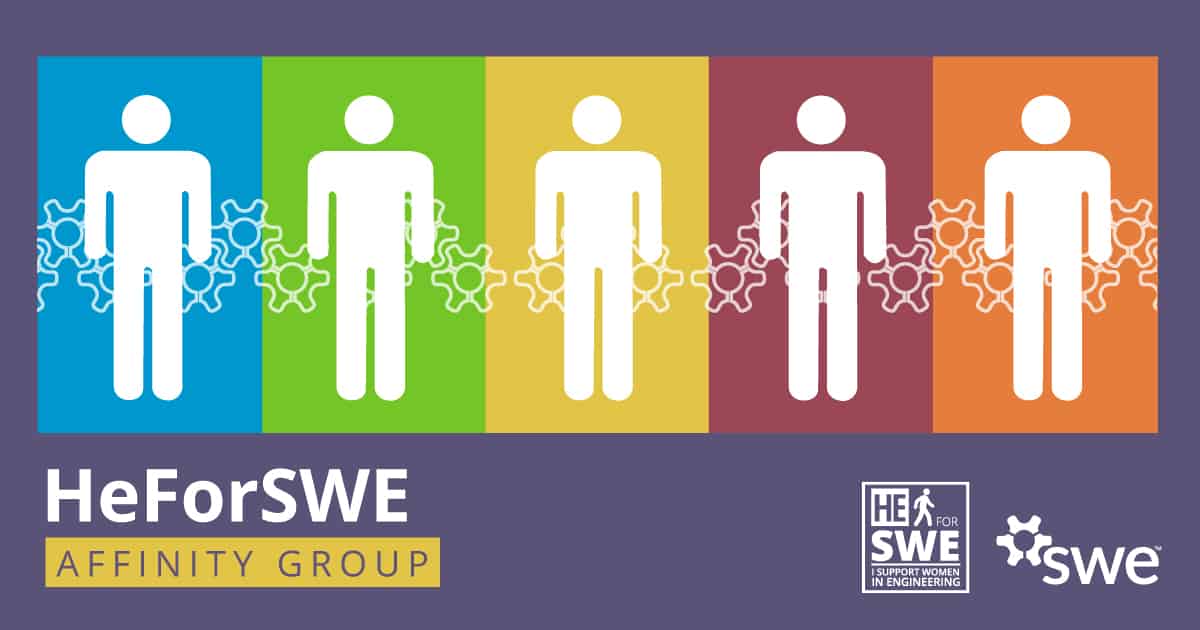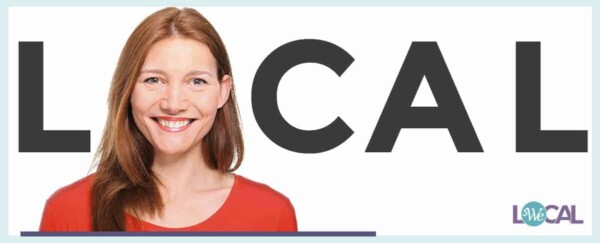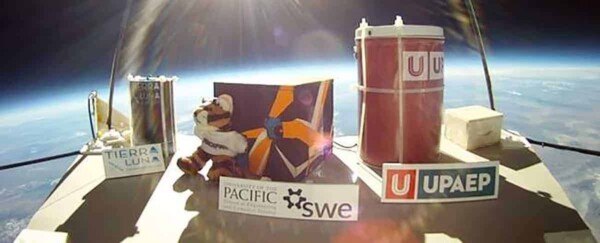As a part of the HeForSWE Affinity Group’s spotlight month, SWE will be highlighting professionals and male allies, discussing their perspectives on allyship in STEM. In this article, we will feature Bianca McCartt (she/her/hers), Wesley Upshur (he/him/his), and Dan Waugh (he/him/his).
Bianca McCartt (She/Her/Hers) – GE Aerospace
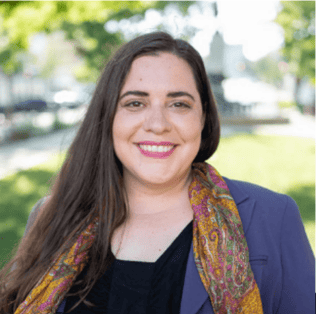
Bianca McCartt joined GE in 2004 on the Aviation Edison Engineering Development Program. Through her career she has woven together a variety of technical experiences in turbine airfoils, CDN, structures design, and systems integration with rewarding opportunities to support the advancement of fellow engineers. Bianca first joined the Technical Capability Development team in 2014 where she was responsible for deploying programs and resources to empower engineers through technical growth and advancement. She later led the effort to implement parallel processes in the Supply Chain including serving as the leader of the Technical Talent Review. Bianca graduated from the University of Kentucky with a Bachelors in Mechanical Engineering. A Life member of the Society of Women Engineers (SWE), she serves on the SWE Senate, as an industry advisor to the Women of Color in Engineering Collaborative and is an active member of SHPE.
What does allyship mean to you?
Being willing to speak up in support of those whose voices are often minimized or not in the room. Using your voice to amplify that of others and ensuring they know you are an advocate.
What advice would you recommend to your male counterparts or team members on how to be an ally and support the inclusion of women in engineering fields?
Listen for the moments when a woman is being interrupted, ignored or questioned more intensely than you would be in the same situation. These are opportunities to use phrases like “I would like to hear more about what Sarah has to say.” or “Danielle’s analysis used the same process that I would use.” It doesn’t require being confrontational, but it helps to validate that your colleague deserves to be listened to.
How has a male ally, mentor or sponsor impacted your career?
Early in my career, my male mentors helped me to build confidence to speak up for myself by demonstrating that they believed in my capabilities. As a mid-career employee, I found it important to have a male ally who could validate that my experiences were not the same as his, and help me to form strategies to counteract unconscious bias. These relationships start from a foundation of trust and are invaluable!
Wesley Upshur (He/Him/His) – GE Aerospace

Wesley Upshur grew up just outside of Nashville, Tennessee with his nine siblings and credits his passion for advocacy and inclusion to this tight knit family oriented community. During undergrad, he seized the opportunity to get involved on campus by joining organizations such as Society of Women Engineers (SWE), National Society of Black Engineers (NBSE), American Society of Mechanical Engineers (ASME) and working as a Senior Resident Assistant (SRA). Through these leadership opportunities, he realized he had a knack for bringing people together, authentically connecting with them, and wanted to see them develop as people, students and professionals. He has continued these endeavors since joining GE Aviation by getting involved in the EEDP inclusion & diversity committee, diversity kaizen hiring event, university recruiting and plans to join the Early Career Professional Organization soon.
What does allyship mean?
To me, allyship is an intentional partnership between people; very similar to how peer mentorship works just on a larger scale. Allyship should be a baseline agreement to use your position, status, knowledge, influence and voice to benefit others as abundantly as possible. Truthfully, I think as leaders, allyship is something we should extend to all those we interact with to the extent we are able to provide it. It benefits everyone, from every non-selfish perspective, to support and develop those around us to their fullest level of competency. The ball is in your hands to ally-oop your teammates.
What inspired you to support and advocate for minorities in the STEM field?
Seeing how my journey can inspire and has inspired others is what inspires me to continue advocating. During undergrad, my younger sister once asked me what it was like being an engineer and by the end of our conversation, she was considering entering the STEM field. I’m the only engineer in my family and didn’t decide to pursue engineering until senior year of high school after a conversation with a career advisor; it simply wasn’t on my radar before that. Two years ago, my ten year old nephew said he wanted to be an engineer like his uncle. Engineering definitely isn’t for everyone and my goal with advocacy is never to convince people to pursue STEM careers but rather to expose them to the possibility of one to hopefully broaden their horizon to make the most informed decision about their future.
How do you engage others to become advocates in the workplace?
Primarily by endeavoring to lead by example and through raising awareness. I’ve had the opportunity to attend diversity kaizens, recruit at universities and conferences. Those experiences often start conversations with my co-workers when they inquire about how I got involved with specific groups or recruiting. Then I get to explain the employee resource group or diversity initiative that I was supporting that led to this opportunity. I think a lot of people have this misconception that advocacy or ERGs is something done in addition to your day job, when it can actually be something done adjacent or interwoven into your day job. It can also be a lot of fun and when you think about it, long term this company is going to look like those we invite and then eventually those who are reassured to stay. That’s how I engage others in advocacy and why I think it’s important.
Can you give an example of a time you’ve implemented allyship actions in your workplace?
Once upon a time, a young woman was extended a job offer to come work on a team that I had been working on for a couple of months. None of my coworkers were shy about voicing their opinions that she shouldn’t have received her offer and that they were not excited about working with her. At the time, I hadn’t met this woman but did not like all the negativity surrounding her hiring. So, I reached out to her and we had a conversation. Much of my coworker’s conversation had gotten back to her through the grapevine. She was initially excited for this job, but the hostile environment was discouraging from even accepting the offer. I told her I couldn’t promise a change of heart to any of my coworkers but that I was not going to allow them to mistreat her. She decided to take the job and by the time she arrived I had been promoted to a team lead position which further helped me improve the work environment and cut down on much of the gossip within the team. I don’t think she would have accepted the job opportunity had I not intervened and when all was said and done, she was a valuable addition to the team.
How do you cultivate conversations in a professional environment about diversity and inclusion?
When hosting open forums, I have the opportunity to facilitate conversations with my peers. Going around the room asking people to share their work experience typically produces a productive conversation. These forums are a nice relaxed and psychologically safe environment for these conversations to take place. To get the conversation started I sometimes ask questions regarding topics I may have heard around the workplace or trends observed through surveys and articles. I employ similar methods during more organic settings such as corporate small talk around the office. Certain persons and personality traits can sometimes dominate conversation. The intention in these situations is to extend an invitation to the quieter members and afford them the opportunity to contribute to the conversations as well. I know I personally really appreciated when someone would ask for my opinion in a group setting when I hadn’t quite developed the skill to fluidly join a conversation without feeling like I was interrupting others and it reassured me that people actually cared about what I had to say. I’m trying to become my own role model so to speak.
Dan Waugh (He/Him/His) – GE Aerospace
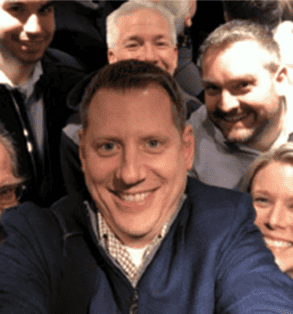
Dan Waugh joined GE Aviation in 1998 on the Operations Management Leadership Program and has 20 years of Supply Chain experience, spanning shop leadership roles at Wilmington, ACSC, and Evendale Development Assembly. Additionally, Dan has held various leadership roles in the Sourcing organization. Dan spent 3.5 years working in the Commercial Engines Organization as the GEnx Product Operations leader and CEO Cost leader, driving system-level improvements for OEM and MRO delivery and cost. Most recently he led our Component Repair business, heavily focused on driving operational stability and leading lean and culture transformation efforts. Dan earned a bachelor’s degree in mechanical engineering from Purdue University and an MBA from Xavier University. Outside of work, he enjoys spending time with his wife and three children, fishing, snow skiing, and painfully still rooting for the Dallas Cowboys!
What does allyship mean to you?
An ally supports and educates themselves and speaks out and advocates for YOU!
Education is power, understanding is strength, and advocacy is growth. Allies actively engage with you in an open and affirming way. All of us need to be fully and authentically welcomed as respect for PEOPLE. Allies help create a space of inclusivity and comfort.
What has driven & inspired you to want to support and become vocal advocates for women and other minorities in the STEM field?
Everyone of us has something special to offer. In a male dominated workforce and a white male myself, I recognize I have privilege. I want to see people succeed and grow and it is a true passion of mine. My responsibility is to use my privilege to lead across the business and bust the conscious or unconscious barriers that stand in the way of people growing. An easy first step to supporting this is to be an advocate and ally myself.
How do you engage other men to become advocates, recognize and want to support these initiatives?
I am a big fan of learning and awareness. The more I share, the more I talk about it, the more men recognize the need and grow themselves. It is a flywheel effect. As more men see me being vulnerable, maybe they will be too.
Can you give an example of a time you’ve implemented allyship actions in your workplace?
I was in a meeting a few weeks ago. I noticed very early on there were 15 people total in the meeting including myself. 14 of us were white males; there was one woman. I paid attention to the discussion and sure enough, it was dominated by the males. I intentionally asked the woman for her thoughts, and she made some very good points. I’d like to think that made her feel a bit more comfortable and involved, but it is certainly something all of us need to watch for. It is so simple to do, but how often do we stop to think about that in business meetings?
How do you cultivate conversations in the professional environment about diversity and inclusion?
By being very open and vulnerable. None of us are perfect and we all want to be involved and appreciated. I feel if I can show my vulnerability, it may help others get more comfortable doing the same, and that’s when the awareness, dialogue, and ultimately involvement really starts to happen.
Opt into the HeForSWE Affinity Group email list by logging into your member portal and updating your Communication Preferences.
Author
-

SWE Blog provides up-to-date information and news about the Society and how our members are making a difference every day. You’ll find stories about SWE members, engineering, technology, and other STEM-related topics.

